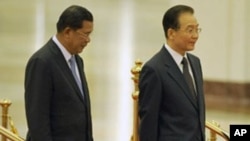Chinese Premier Wen Jiabao arrives in India Wednesday for talks expected to center on building trust between the two nations. India and China have many differences, despite improved ties.
Indian Foreign ministry spokesman Vishnu Prakash says the bilateral relationship is steadily improving. "Over the years our relationship has evolved, has grown, has matured and has become truly multifaceted," he said.
But key differences continue to mar ties. And, it is these differences which the prime ministers of India and China will try to smooth out when they meet, Thursday.
There has been little progress in resolving a border dispute despite years of negotiations. A recent Chinese policy of stapling visas, instead of stamping them, in passports held by residents of Indian Kashmir has raised hackles in New Delhi.
India sees this as questioning the disputed area's status as an integral part of the country. High-level military exchanges have also been put on hold, after China refused a visa to an army general posted in Kashmir.
Indian officials have said that China should show more sensitivity to issues that impinge on its sovereignty and territorial integrity.
However, on the economic front, relations are booming. China is set to emerge as India's largest trading partner, in 2010, with bilateral trade touching $60 billion. Both countries' economies are thriving, despite a global slowdown. They are expected to sign a series of business deals during the visit.
But India will press Beijing to open its markets wider because the trade is heavily tilted in China' favor. Foreign ministry spokesman Vishnu Prakash says India wants to bridge the growing trade gap.
"At the same touch we are in touch with our Chinese friends on the issue of the growing trade imbalance between the two countries," Prakash said, "and working toward obtaining better access for products like IT services, pharmaceuticals, agriculture products, in which we are quite competitive."
India is also likely to press for greater support from China for a permanent seat on the United Nations Security Council, something it got from the U.S. President Barack Obama during his visit to New Delhi last month.
From New Delhi, the Chinese prime minister will travel to Pakistan - India's rival, with which Beijing has close ties. China's closeness to Islamabad is also viewed with a measure of suspicion in India.




